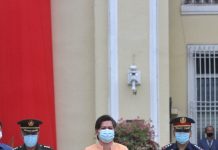Only foods that meet all quality and labeling standards imposed by pertinent laws and administrative regulations–even though the food may not be readily marketable due to appearance, age, freshness, grade, size, surplus, or other conditions–are acceptable for donation as per Republic Act 9803 or the Food Donation Act of 2009.
In advancing this Act, the Department of Social Welfare and Development (DSWD) recently conducted a Mindanao cluster consultation on the draft implementing rules and regulations of the Act which encourages donation of food for charitable purposes.
Present were heads of national agencies in Mindanao such as the Philippine Red Cross (PRC), Department of Health (DOH), DSWD, National Nutrition Council (NNC), National Meat Inspection Service (NMIS), Office of Civil Defense (OCD) and officials of Local Government Units (LGUs) and Non-Government Organizations (NGOs).
The Food Donation Act aims to alleviate national poverty and reduce food wastage. Excluding milk products, food donations refer to any raw, cooked, processed, or prepared edible substances, ice, beverage, or ingredient used or intended for use in whole or in part for human consumption. Food donations are encouraged in normal times and in times of calamities, emergencies, disaster and other similar situations.
A certificate of acceptance and a certificate of fitness are issued to a donor when donated foods are fit for human consumption while a certificate of rejection is issued upon confirmation that foods for donation are not fit for human consumption.
DSWD and PRC lead the Interagency Committee implementing this Act in coordination with the Food and Drug Administration (FDA), NNC, OCD, Food and Nutrition Research Institute (FNRI), Hotel and Restaurant Association of the Philippines (HRAP), Union of Local Authorities of the Philippines (ULAP), NMIS, and LGUs.
The committee is tasked to identify beneficiaries; facilitate collection, storage and distribution; prepare allocation plan; screen and inspect food products; conduct organoleptic testing [inspection thru visual, feeling and smelling] of processed food products; provide technical assistance and logistical support; undertake research and development; among others.
DSWD assistant secretary Vilma B. Cabrera and member of DSWD legal team, lawyer Marijoy D. Segui, served as resource speakers during the consultation. PNA






